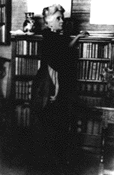
History and Systems of Psychology
(Spring II 2003)
Instructor:
Dr. Linda M. Woolf

History and Systems of Psychology
(Spring II 2003)
Instructor:
Dr. Linda M. Woolf
|
A perusal of the various journals in psychology or an examination of any psychology conference schedule seems to suggest that psychology is a highly disjointed discipline. However, psychology is unified through its historical traditions and systems of thought. In this course, we will explore the roots of modern psychological thought and methodology. We will trace these roots from their origins in philosophy and the natural sciences through the early schools of psychology and on into its current form. In addition to learning about the major schools and systems of psychology (e. g., Functionalism, Structuralism, Gestalt, etc.), we will explore how cultural and political forces shaped the development of various psychological theories. We will also examine the lives and works of the men and women whose work created psychology's foundation. Through these explorations we will discover the common threads and patterns interwoven into the broad tapestry of psychology.
Three exams, a term paper, and class participation/discussion of assigned readings.All grades will be assigned on a scale of 0 - 100 with:
90 - 100 A-,A Superior Work 80 - 89 B-,B,B+ Good Work 70 - 79 C-,C,C+ Satisfactory Work 60 - 69 D,D+ Passing, but less than Satisfactory Less than 60 F Failing
Percent of Grade:
Examinations 75% Term Paper 20% Class participation/discussion 5% Examinations: Examination format will include multiple choice, short answer, matching, and essay. They will cover material presented in lecture, readings, and discussion. Three examinations will be given. Each exam will constitute 25% of your final grade.
POLICY STATEMENTS: All exams must be taken on the date scheduled except in case of an emergency. In case of the above, the instructor must be notified in advance that a test is going to be missed. No make-up exams will be provided if you fail to notify and discuss your situation with the instructor. No extra credit work will be made available to make-up for a poor test grade.Term Paper: Students will be required to write a term paper of 8-10 pages. The purpose of the paper is to provide you, the student, with an opportunity to explore an another area within the history and systems of psychology, in depth. You may, for example, you might want to explore a particular concept in the history of psychology or review the works of a key figure. You must include at least 8 references. The majority of your references should be from primary sources and not others works on the topic or individual. A half page abstract (description of your paper) is due by April 3 via email - woolflm@webster.edu. The final paper is due May 8, 2003.
Attendence Policy: The following is my policy for attendance and absences. This policy will be used in this class. "If any student misses a class, the student is responsible for that night's work plus a make-up assignment. If the student misses two nights, the student's grade will be reduced by one letter grade as this represents 25% of the class missed. If the student is absent for a third week, the student will be given an "F" for the course. It is the student's responsibility to withdraw from the course." Note: Coming in to class late or leaving early will count towards the number of classes missed. Remember that missing 2 hours of class is the equivalent of missing an entire week in a sixteen week class. Thus, if one misses one full evening of class plus half of another evening, the students grade will be dropped by a half letter grade (5 percentage points).Plagiarism (attempting to pass off the work of another as one's own) is not acceptable and will result in a grade of 0 for that assignment and will be turned over to the appropriate university source for disciplinary action. In addition, cheating on exams will also result in the same fate.
This site will help you avoid the problem of plagiarism particularly plagiarism resulting from paraphrasing too closely to the original source. - Establishing authorship by Paul C. Smith, Alverno CollegeLate withdraws from this class will not be approved by the instructor except in cases of emergency discussed with the instructor. No late withdraws will be approved on the basis of poor class performance.
This syllabus is subject to change at the instructor's discretion. All changes concerning course requirements will be provided in writing. Changes concerning exam dates may be made at the instructor's discretion and communicated verbally to the class.
It is understood that remaining in this course (not dropping or withdrawing from this course) constitutes an agreement to abide by the terms outlined in this syllabus and an acceptance of the requirements outlined in this document. No grade of Incomplete will be issued for this course.